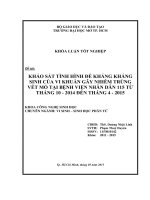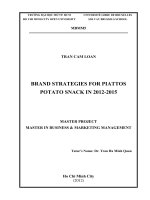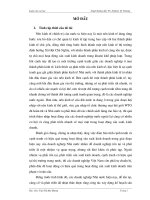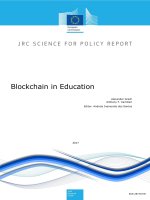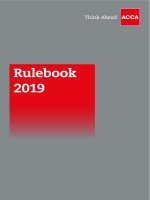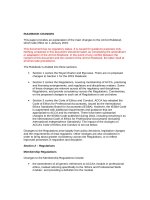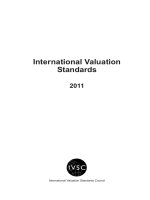Rulebook 2019 commentary
Bạn đang xem bản rút gọn của tài liệu. Xem và tải ngay bản đầy đủ của tài liệu tại đây (61.37 KB, 6 trang )
RULEBOOK CHANGES
This paper provides an explanation of the main changes to the ACCA Rulebook,
which take effect on 1 January 2019.
This document has no regulatory status. It is issued for guidance purposes only.
Nothing contained in this document should be taken as constituting the amendment
or adaptation of the ACCA Rulebook. In the event of any conflict between the
content of this document and the content of the ACCA Rulebook, the latter shall at
all times take precedence.
The Rulebook is divided into three sections:
•
Section 1 carries the Royal Charter and Bye-laws. There are no proposed
changes to Section 1 for the 2019 Rulebook.
•
Section 2 carries the Regulations, covering membership of ACCA, practising
and licensing arrangements, and regulatory and disciplinary matters. Some
of these changes are relevant across all the regulatory and disciplinary
Regulations, and provide consistency across the Regulations. Commentary
on the proposed changes to each set of Regulations is set out below.
•
Section 3 carries the Code of Ethics and Conduct. ACCA has adopted the
Code of Ethics for Professional Accountants, issued by the International
Ethics Standards Board for Accountants (IESBA). However, the IESBA Code
is augmented with additional requirements and guidance that are
appropriate to ACCA and its members. There have been substantial
changes to the IESBA Code published during 2018, including renaming it as
the International Code of Ethics for Professional Accountants (including
International Independence Standards). The impact of the changes on
ACCA’s Code of Ethics and Conduct is set out below.
Changes to the Regulations arise largely from policy decisions, legislative changes
and the requirements of lead regulators. Other changes are also considered in
order to bring about greater consistency across the Regulations, or to reflect
improved processes in regulation and discipline.
Section 2 – Regulations
Membership Regulations
Changes to the Membership Regulations include:
•
the amendment of all generic references to ACCA’s module in professional
ethics, instead referring specifically to the ‘Ethics and Professional Skills
module’, and providing a definition for the module
•
the ability to exclude persons from a hearing (providing consistency with
other Regulations)
•
clarification concerning the disclosure of personal data, in order to ensure
compliance with the General Data Protection Regulation (regulation 4(7))
•
a provision requiring written reasons for a decision to be provided to an
applicant (following a bankruptcy event) (regulation 13(9))
and
•
new provisions concerning service of notices and documents (regulation
15), including:
o the ability to serve a copy of the notice served on the relevant person
with that person’s representative
o that notices and documents sent by email will be deemed to have
been served on the day on which they are delivered, rather than after
72 hours (as is the case currently)
o that the relevant person will no longer be required to indicate
willingness to receive service by email, so long as he or she has
previously notified ACCA that a particular email address is suitable for
communication
o where the relevant person has no registered address, service at the
relevant person’s last known address has been removed, in order to
avoid the implication that data may be retained by ACCA beyond
permitted periods.
Global Practising Regulations
Changes to the Global Practising Regulations include:
•
changes to reflect the removal of the detailed Practising Certificate Training
Requirements from the annexes to the Regulations, in order to allow greater
agility within the Practising Certificate Experience Requirement (available on
the ACCA website)
•
clarification that trust or company services do not constitute public practice
(regulation 4(3)), and so do not give rise to the need to hold a practising
certificate. Nevertheless, members providing trust or company services who
are not supervised by ACCA for anti-money laundering will be required to
register with HMRC.
•
simplification and clarification of the honorary reporting exemption
provisions, which simplify the regulation, and would enable a member to
undertake an independent examination for a charity whose gross income
does not exceed £250,000 (regulation 4(5))
and
•
removal of the requirement to hold an ACCA practising certificate for South
African members (Annex 5), and the transfer of all those who renewed their
practising certificates with effect from 1 July 2018 to the register of
practitioners from 1 January 2019. (Specific requirements in respect of
registered tax practitioners are required to be retained in accordance with
the requirements of the South African Revenue Service, namely the ‘fit and
proper’ requirements of regulation 5 and the CPD requirements of regulation
6).
Authorisation Regulations
Amendments to the Authorisation Regulations:
•
make consideration of applications under regulation 3(2) by a Chairman
(alone on the papers) the norm
•
include the requirements of the Statutory Auditors and Third Country
Auditors Regulations 2016 with regard to orders of the Admissions and
Licensing Committee (regulation 6(14))
•
bring together all the publicity requirements, and require post-hearing
publicity (with reasons), subject to a hearing (or part of a hearing) being held
in private
•
better explain the limited circumstances in which a regulatory assessor’s
decision would not be published (regulation 7(6))
•
extend the period for notification and submission of documents by the
relevant person to 21 days before a hearing, and so enhance consistency
throughout the Regulations
•
clarify the slip rule (regulation 8(1))
and
•
amend the regulations in respect of the service of documents, consistent
with the Membership Regulations and throughout the Rulebook.
Complaints and Disciplinary Regulations
Amendments to the Complaints and Disciplinary Regulations:
•
refer more consistently to notices and documents being ‘served’, rather than
‘received’
•
make clear that the chairman who grants an application to withdraw an
allegation shall determine the issue of costs, rather than a Disciplinary
Committee
•
extend the period for notification and submission of documents by the
relevant person to 21 days before a hearing, and so enhance consistency
throughout the Regulations
•
remove the requirement to have a differently constituted Health Committee
where the Disciplinary Committee orders referral to a health hearing
(regulation 10(12))
•
clarify the slip rule (regulation 19(1)(d))
and
•
amend the regulations in respect of the service of documents, consistent
with the Membership Regulations and throughout the Rulebook.
Appeal Regulations
Changes to the Appeal Regulations include:
•
consistent references to notices and documents being ‘served’, rather than
‘received’
•
where an application to appeal has been refused by the Chairman, removal
of the relevant person’s right to request that his application be considered by
an Appeal Committee. Instead, permission to appeal may be considered by
a second Chairman. (regulations 6 and 10(1))
•
extension of the period for notification and submission of documents by the
appellant to 21 days before a hearing, and so enhance consistency
throughout the Regulations
•
provision to allow concessions to be made by the respondent at any time
during the appeal process, and not only while the appellant is seeking
permission to appeal (regulation 9(6))
and
•
amendments in respect of the service of documents, consistent with the
Membership Regulations and throughout the Rulebook.
Interim Orders Regulations and Health Regulations
Changes to the Health Regulations permit the relevant person (as well as other
parties) to request that his fitness to participate in the proceedings be considered by
the Health Committee. Both sets of Regulations have also been amended to clarify
the slip rule.
Section 3 – Code of Ethics and Conduct
In April 2018, the International Ethics Standards Boards for Accountants (IESBA)
issued its final pronouncement on its project to restructure the IESBA Code of
Ethics for Professional Accountants. The major revision of the ethical framework for
professional accountants was highlighted in an article ‘The evolution of ethics’,
published in Accounting and Business magazine (October 2018).
The IESBA International Code of Ethics for Professional Accountants (including
International Independence Standards) (‘IESBA Code’) includes substantive
revisions and is completely rewritten under a new structure and drafting convention.
Other key revisions to the restructured IESBA Code include enhancements in the
areas of:
•
‘safeguards’ (better aligned to threats to compliance with the fundamental
principles)
•
long association of personnel with audit clients
and
•
professional accountants in business and pressure to breach
the fundamental principles.
Changes to the long association provisions are mandatory from 15 December 2018,
and the other sections of the restructured IESBA Code are effective from 15 June
2019, or periods starting on or after that date.
The 2019 Rulebook incorporates the restructured IESBA Code within Section A of
the ACCA Code of Ethics and Conduct (‘ACCA Code’), as early adoption of the
restructured IESBA Code is permitted by IESBA.
The ACCA provisions (ie material that does not appear in the IESBA Code) that
were previously held in sections B1 to B12, C1 and C2 have been incorporated
within Sections B and C of the ACCA Code. Such material continues to be denoted
by the use of italics.
Other ACCA provisions have also been retained within the ACCA Code. In
particular, ACCA’s provisions in respect of the marketing of professional services
have been preserved as a separate section, B13.
Other changes to the ACCA Code include:
•
retitling the ‘preface’ to the ACCA Code as the ‘Guide to the ACCA Code of
Ethics and Conduct’ – this is now a combination of the ACCA preface and
the IESBA Guide
and
•
embedding a recently completed project of the IESBA on the offering and
accepting of inducements in sections 250, 340, 420 and 906.
